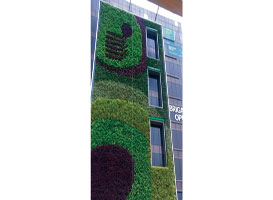

The sustainable design of Brigade Opus’ green wall takes environmental engineering concepts to the next level.
Brigade Group has created what the company claims to be India’s largest living biowall at Brigade Opus, a LEED Gold pre-certified Grade-A commercial office space in Hebbal, Bengaluru. Strategically located on the International Airport road, Brigade Opus is well-connected to the central business district and is available for lease.
Green aesthetics
The biowall at Brigade Opus is all set to take over the conventional glass façades of Bengaluru. Measuring 16 m height x 25 m width (400 sq m), its biowall houses seven different species of plants such as foxtail fern, moses-in-the-cradle, lilyturf, mondo grass, pandan screw pine and money plant, with a total of 15,750 plants. Besides its aesthetic appeal, it will have a direct positive impact on the tenants by keeping the interiors of the building cooler and improving the air quality around it. The living wall can be automated and monitored with natural air purification and humidification.
The living green walls, the brainchild of MR Jaishankar, Chairman and Managing Director, Brigade Group, are as equally impressive in appearance as they are purveyors of good health. Employees are greeted by a green lush environment while savouring the soothing effects of being around an abundance of foliage. The living green walls are natural air-filters, creating a cleaner, more invigorating work environment that will lead to a better overall employee health and production. Office workers are often exposed to air toxins in their work environment such as formaldehyde, carbon monoxide, VOCs and benzene. These walls metabolise harmful toxins and release oxygen into the workplace air.
Sustainable design
The aluminium frame, biowall plant installation and independent modules are designed in a way that the green wall also features Brigade Group’s logo, which signifies scaling new heights, upward and onward towards the sun. Considering the challenges of urban living, and to address the space constraints, Jaishankar devised the idea of this biowall, which sets a great example for effective space utilisation.
The sustainable design of the green wall takes environmental engineering concepts to the next level. The green wall has all the systems in place, including recycling, rainwater harvesting and ensures zero wastage of water. The drip irrigation system consists of the main line, lateral pipes, drippers and misters supported by an overhead fresh water tank with automatic timed sprinkler systems and dust misters to keep the green wall clean, fresh and constantly rejuvenated with the help of an irrigation sprinkler system with a filter and fertilisation unit supported by a 2,000 litre fresh water tank.
By maximising both quality and quantity of the plants on the Biowall, there will be more photosynthesis in general taking place. This means that more carbon dioxide in the building would be converted to oxygen. To keep this, food or light are sufficiently provided to the plants by the state-of-the-art irrigation sprinkler system and exposure to natural sunlight. The water system is designed and engineered keeping in mind constant recycling, rainwater harvesting and no wastage of precious resources. Brigade Group’s Greenwall at Brigade Opus is indeed one of a kind masterpiece of design, architecture and urban agriculture.